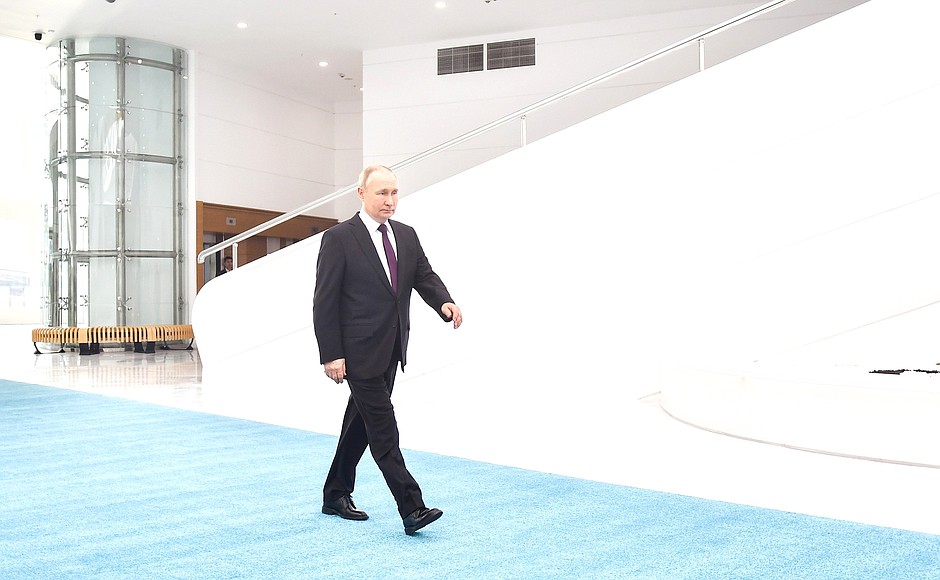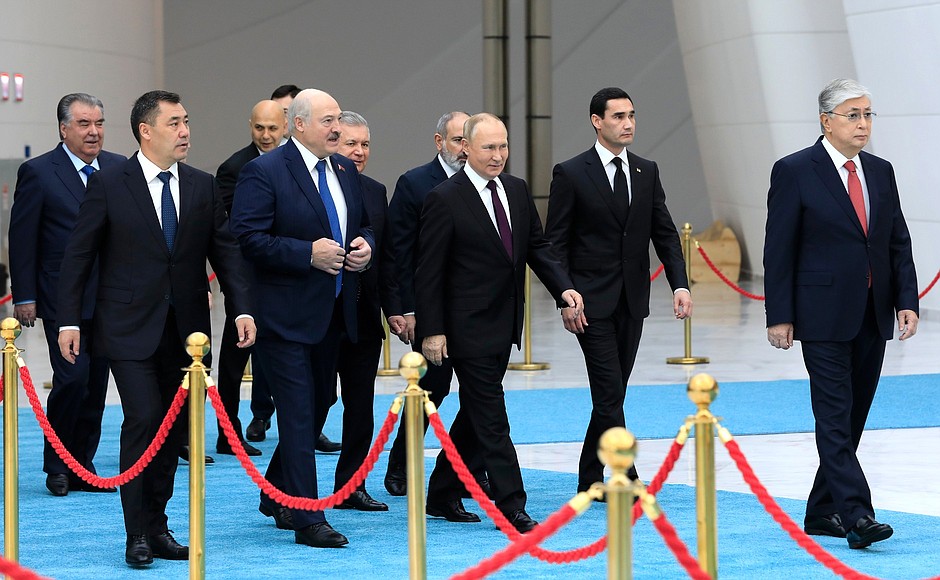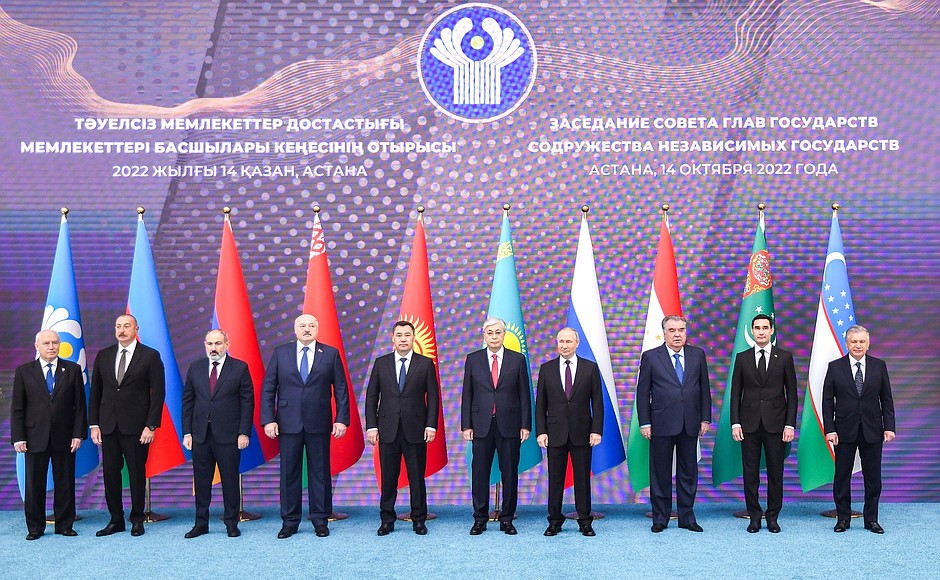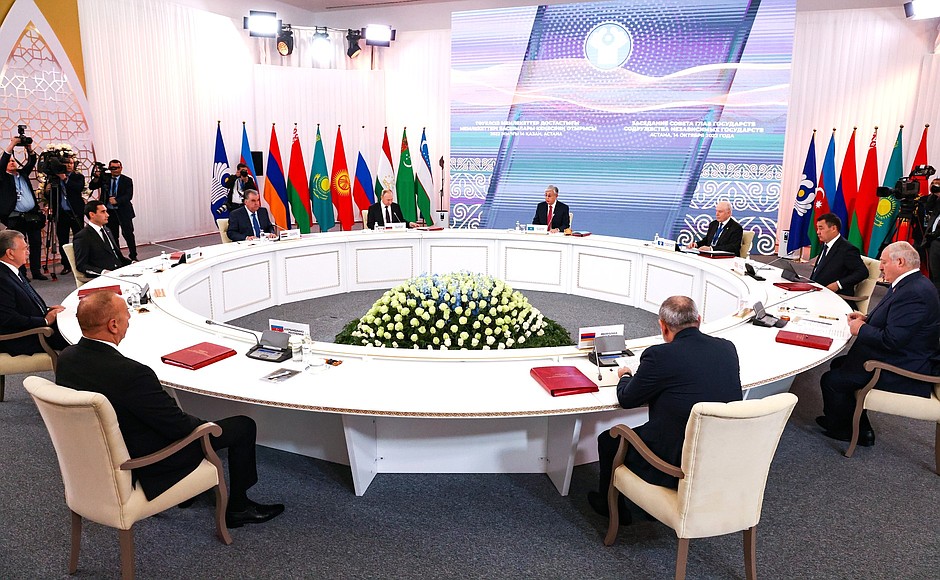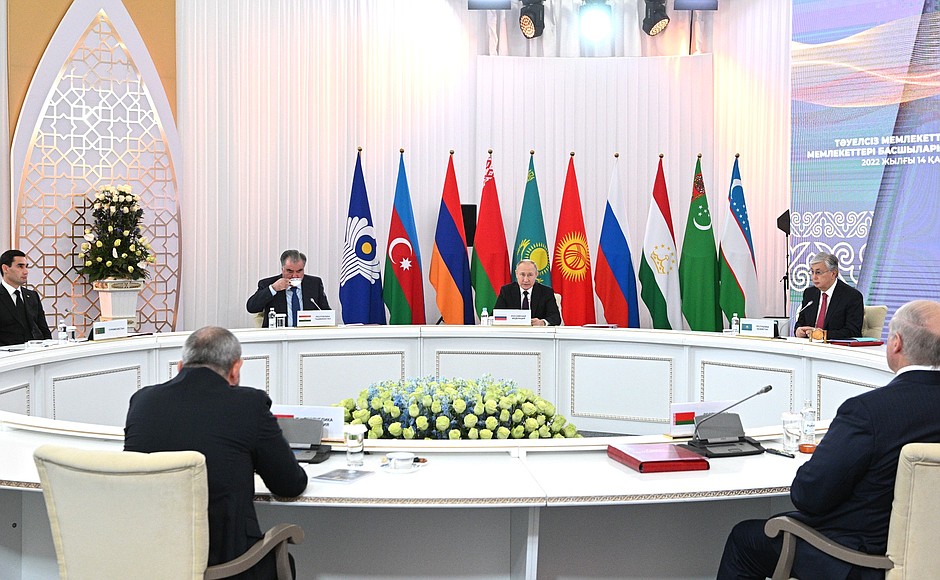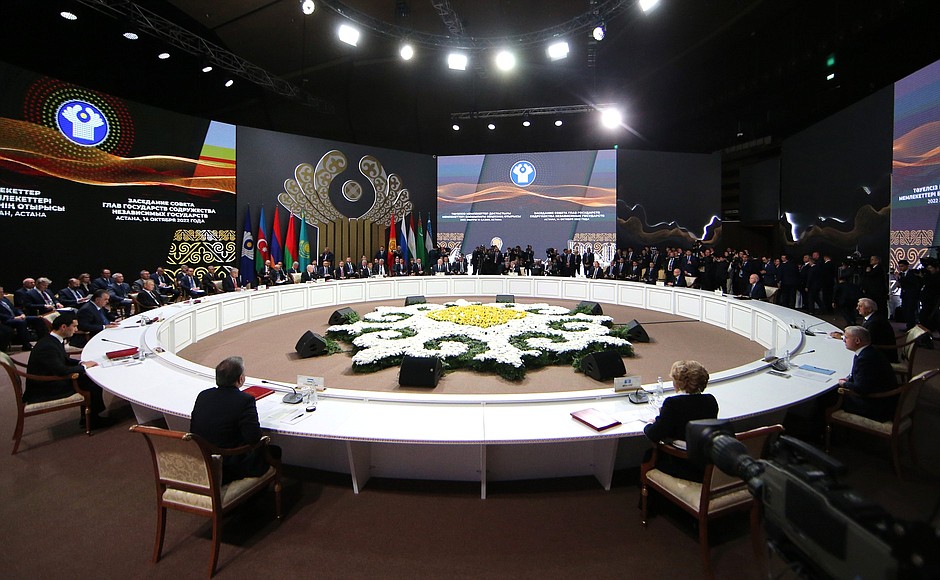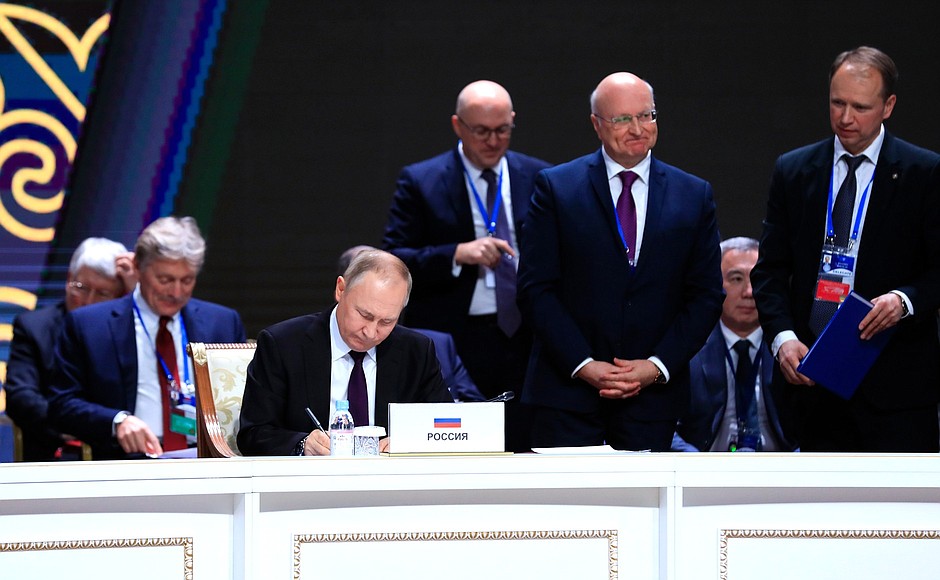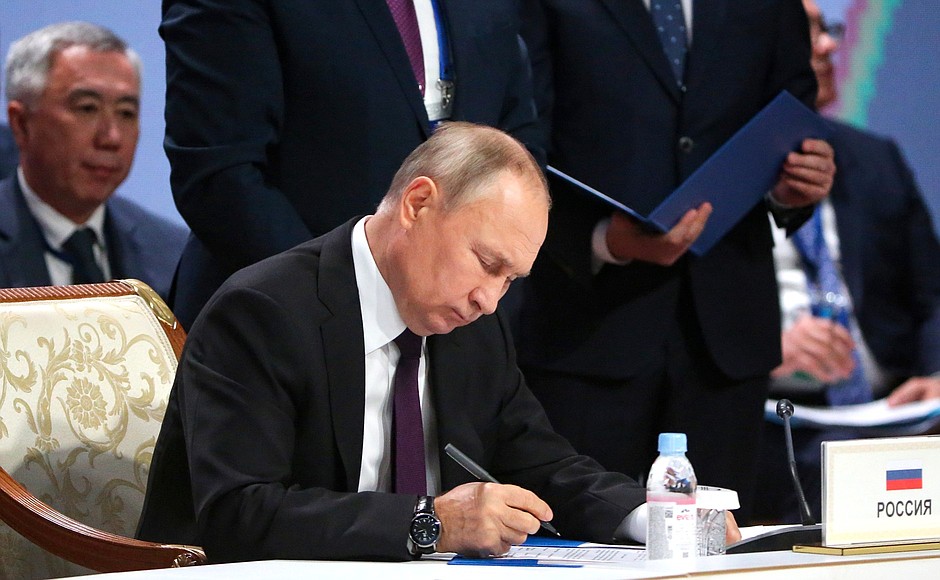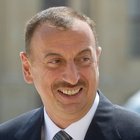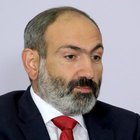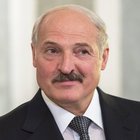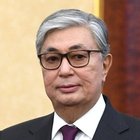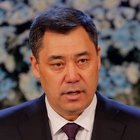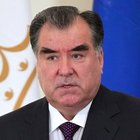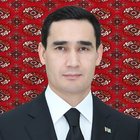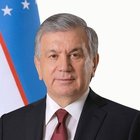Also taking part in the restricted-attendance meeting were President of Azerbaijan Ilham Aliyev, Prime Minister of Armenia Nikol Pashinyan, President of Belarus Alexander Lukashenko, President of Kazakhstan Kassym-Jomart Tokayev, President of Kyrgyzstan Sadyr Japarov, President of Tajikistan Emomali Rahmon, President of Turkmenistan Serdar Berdimuhamedov, President of Uzbekistan Shavkat Mirziyoyev and Chairman of the Executive Committee and Executive Secretary of the Commonwealth of Independent States Sergei Lebedev. The meeting later continued in an expanded format with participation of members of the delegations.
The discussion focused on key aspects of interaction within the CIS, ways to improve the organisation’s efficiency and the performance of its executive and industry-related bodies.
A package of documents was adopted following the CIS Heads of State Council meeting, including the Resolution on the Role of the Interparliamentary Assembly of CIS Member Nations in the Development of the Commonwealth of Independent States, resolutions on the international organisation to support and promote the Russian language under the CIS umbrella, and on announcing 2024 – the Year of Volunteer Movement, 2025 – the Year of the 80th Anniversary of Victory in the Great Patriotic War, Year of Peace and Unity in the Fight Against Nazism, and 2026 – the Year of Health Protection.
The CIS heads of state also signed the Agreement on the Establishment of the Advisory Council of the Heads of Election Agencies of the CIS Member States and Agreement on Cooperation of the CIS Member States in Countering Corruption.
Several decisions have to do with the Programme of Cooperation of the CIS Member States in the Fight Against Terrorism and Extremism for 2023–2025, declaring St Petersburg, Russia, the CIS Cultural Capital in 2023, and granting the CIS the observer status at the Collective Security Treaty Organisation.
Other documents adopted at the meeting deal with cooperation on climate issues and culture, trade in services, and investments.
Also, it was decided to establish CIS Observer status and CIS Partner status.
* * *
Speech at restricted-attendance meeting of CIS Heads of State Council
President of Russia Vladimir Putin: <… > I would also like to note the responsible and proactive approach to the current chairmanship shown by our Kazakhstani friends.
The CIS has come a long way over the past three decades. The group has established itself as a respected regional integration association where the member states are building relations based on the principles of neighbourly coexistence, partnership, mutual benefit and consideration of each other's interests. Most importantly, thanks to the CIS, our countries have managed to preserve – and even increase – their economic, social, cultural and humanitarian ties they had developed over many years of being part of a single state.
See also
I would also like to note that despite the sanctions pressure, something we are all well aware of, our economic exchanges with the CIS countries are consistently expanding. Last year, Russia's trade with the CIS countries increased by more than 30 percent, and in the first half of 2022, by another 7 percent, to US$46 billion. Last year the figure was US$96 billion for the entire year.
The CIS countries are increasingly interested in cooperating to develop green economy and go digital, in the widespread use of innovations, and complex and rational use of natural resources.
We have stepped up joint activity on import substitution and boosting our technological and financial sovereignty. In particular, vigorous efforts are being made to move to mutual payments in national currencies. This makes it possible, regardless of external factors, to expand exchange of commodities, make mutual investments, scale up our own capital market, and thereby deepen continental economic integration.
Of course, for all the positive aspects of cooperation in the CIS, we must admit that, unfortunately, sometimes there are inconsistences, differences and conflicts. We are well aware – our colleagues have just spoken about this. Yesterday, we discussed the same problems with the presidents of Tajikistan and Kyrgyzstan.
Of course, we should strive to find a way out of the situation no matter where it may emerge. I believe everyone has goodwill, and we should make the most of it.
Of course, we welcome mediation no matter who offers it insofar as these efforts help ease tensions to the benefit of all parties in any disputes and conflicts. This also concerns our partners from any countries, including the US and Europe.
That said, yesterday I was surprised to read some comments by the French President on the results of the meeting in Prague on October 6. I think these statements point to a lack of understanding of how this conflict is developing and, by all appearances, a lack of information on the positions of the sides, too. This is why they sounded inappropriate, and I’d say, even perverse, and are unacceptable for this reason. There will be an opportunity to discuss all this with the President of France.
In any event, Russia has always been sincerely striving to settle any conflicts, including those linked with Karabakh and around it. We have repeatedly met in the trilateral format, saying that it would make sense to do so in the current conditions. I am pleased to invite the President of Azerbaijan and the Prime Minister of Armenia to agree on a date – I understand they are interested in this – and meet in Russia at any place and at any time – in Sochi, St Petersburg or Moscow. We will discuss it with you and make a decision.
I would not like to go into detail at this point. I believe my colleagues have already said enough on this issue. We will discuss it later at a restricted-attendance meeting where, I hope, we will move forward, as we did up to now, in settling specific problems that arise on this track.
I would like to say a few more words about cooperation within the CIS.
I am satisfied to note that a number of important joint documents and decisions have been submitted for subsequent approval following this meeting. They stipulate more profound integration in the most diverse spheres. All of them help implement the long-term CIS development programme and the CIS economic development strategy until 2023. In the long run, they aim to create a pro-integration, political, economic and cultural and humanitarian association on the basis of our Commonwealth. This association will guarantee the effective development of each member, as well as beneficial trade and economic interaction.
As another step towards achieving this goal, I would like to note a draft decision on finalising the agreement on free trade in services and on investment that has been submitted to the Heads of State Council for subsequent approval. The agreement will make it possible to establish a common CIS market and to ensure unimpeded investment exchanges. This, in turn, will open up new and truly boundless opportunities for jointly implementing business initiatives in our countries, as well as major investment and infrastructure projects that increase intra-CIS connectivity and help involve economies and companies in Eurasian production and transportation chains more actively.
In this context, Russia’s efforts to reorient exports and imports open up serious prospects. This facilitates the development of transport corridors in the entire Greater Eurasia region. Consequently, I believe that efforts to establish the East-West and North-South trans-Eurasian corridors passing via CIS states is our key task. This is of interest to Russia and all states, our neighbours and our friends because this expands our transport capabilities and economic benefits.
The importance of stepping up our joint effort to strengthen security in our common region and promote collaboration between the CIS and the Collective Security Treaty Organisation was repeatedly emphasised at the previous meetings of the CIS leaders. My colleagues spoke about this here.
We certainly support the decisions on the Commonwealth obtaining observer status in the CSTO, which have been submitted for our approval. If some colleagues, specifically the Prime Minister of Armenia, have concerns in this regard, I think we must look into this matter more carefully. Yes, I believe we should pay attention to and work on this, but it seems to me that the fact itself of the CIS being a CSTO observer is no hindrance to anyone, but on the contrary, in my view, it creates additional opportunities for using all these venues to hold extra consultations and meetings, discuss things, and seek solutions.
I would also think it expedient to fully use the potential for interaction between the CIS and the Shanghai Cooperation Organisation, specifically in the fight against terrorism, crime, drug trafficking, and corruption. The Programme of Cooperation among the CIS Member States in the Fight Against Terrorism and Extremism for 2023–2025, which we are supposed to sign today, will provide specific opportunities for this. It seems that the CIS and SCO could align their efforts in a closer manner while addressing such important objectives as promoting transport connectivity and inter-regional trade as well as contracts in culture, tourism, science, technology, and healthcare.
Humanitarian cooperation is, without a doubt, a priority for collaboration within the CIS. The existing annual practice to assign the Commonwealth’s cultural capitals creates a favourable climate for promoting multifaceted ties in this area. We are thankful for your supporting the Russian initiative to declare the city of St Petersburg the 2023 cultural capital.
My colleagues and I have discussed the possibility of holding an informal meeting in the future cultural capital ahead of 2023. I have the pleasure of inviting all of you.
Let me also remind you that in December 2020 we made a decision to declare 2023 the Year of Russian as a Language of Interethnic Communication in the CIS. It is symbolic that we are approaching its launch with an interesting new project proposed by Mr Kassym-Jomart Tokayev, the President of Kazakhstan, on the creation of an international organisation for the promotion of Russian under the CIS umbrella. Naturally, we will provide all-out assistance in implementing this initiative.
Colleagues, I would like to note that this is not something prepared in advance but really President Tokayev’s idea. He shared his proposal with me some time earlier. Of course, Russia cannot but support this initiative.
Russia also supports the draft decision on other theme years in the CIS. We can see that consensus has been reached on 2024, which will be the Year of Volunteer Movement, and on 2026, the Year of Health Protection.
Now to 2025: we suggest discussing the possibility of declaring it the Year of the 80th anniversary of Victory in the Great Patriotic War, but also the Year of Peace and Unity in the fight against Nazism. Thus, in the context of some countries’ attempts to erase from memory the feat of the Soviet people in saving mankind from the Nazi plague, we would send a clear signal and call for unity in upholding the historical truth, in the fight against Nazism.
I would also like to note that we attach great importance to strengthening the parliamentary dimension of cooperation. The CIS Interparliamentary Assembly has a special place in the system of Commonwealth bodies; standard legal acts being developed help to ensure the harmonisation of national legislations. Corresponding issues will be discussed at the expanded meeting, which has already been mentioned here.
In conclusion, I would like to thank all my colleagues for supporting Russia’s proposal to approve Chairman of the Executive Committee – CIS Executive Secretary Sergei Lebedev for the next term. He is well known to everyone; in fact, there is no need for me to repeat this as his character references have been voiced.
I also want to wish success to our Kyrgyzstani friends, who will assume the CIS presidency in 2023. Of course, we will do everything that is required of us, if our help is needed, in order to assist our Kyrgyzstani friends during their presidency.
Thank you.
